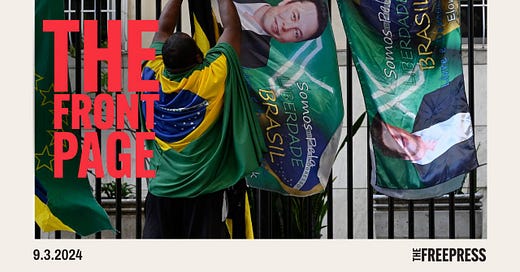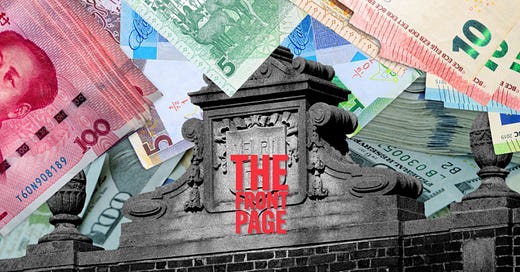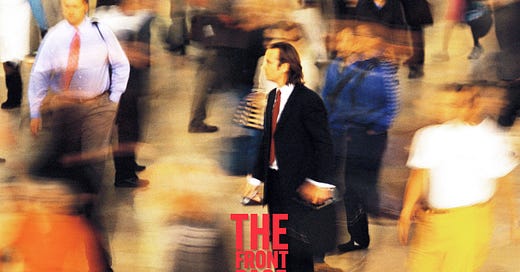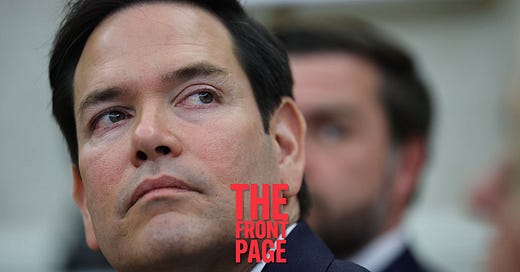
The Free Press

It’s Tuesday, September 3, and this is The Front Page, your daily window into the world of The Free Press—and our take on the world at large.
We’re back from a hiatus at the end of a nonstop summer. And while we were catching our breath, the stories we were most itching to cover concerned the sine qua non of everything we do at The Free Press: free expression.
So here we are with a special free-speech edition of The Front Page to make up for it, featuring essays by Matt Taibbi, Abigail Shrier, and Andrey Mir.
X, formerly Twitter, is now banned in Brazil. As of last Friday, the Elon Musk–owned platform is no longer accessible in the largest country in South America. And if any of the 22 million Brazilians with X accounts are caught attempting to log in via a VPN, they face fines of $8,900 per day.
This crushing blow to free speech has been met with universal condemnation here in the United States. In a White House statement, Joe Biden denounced the clampdown on the U.S.-owned platform as an illiberal and unjustified attack on a sacred freedom. America’s leading liberal newspapers issued full-throated denunciations of the move, warning that a once healthy liberal democracy had taken a big step toward autocracy. Large crowds gathered outside the Brazilian embassy to express their disapproval.
Just kidding.
Joe Biden hasn’t said anything about what’s happening in Brazil. (Not that he says or does much about anything these days.) The editorial boards at The New York Times and The Washington Post have been quiet. Crickets too from once-proud institutions like the ACLU, Amnesty International, and PEN, places nominally committed to protecting free-speech rights.
The silence from right-thinking Americans has been deafening. But to anyone who has followed debates about free expression over the last decade or so, entirely unsurprising.
The legal fight that culminated in Brazil’s Twitter block started with an initiative to clamp down on the kind of right-wing fake news that the American elite has been fretting about since 2016. Alexandre de Moraes, the controversial Brazilian judge leading the censorship push, was granted sweeping powers to order platforms to ban users ahead of the 2022 Brazilian election as part of an effort to combat hate speech and misinformation.
Under Elon Musk’s ownership, X has ignored such orders—which included requests to ban prominent conservatives and sitting lawmakers. And the ever-escalating standoff between Brazil and Musk has now culminated in a shutdown of the platform.
This is the latest reminder that you don’t need to agree with Musk on much to be grateful that maybe the most important speech platform in the world is in the hands of a free-speech absolutist—and the rare billionaire willing to use his fuck-you money. Brazil’s war on Musk is total: de Moraes has frozen the bank accounts of Starlink, Musk’s satellite-internet company. And all of this has been cheered on by Brazilian president Lula da Silva, who said Monday that “the world is not obliged to put up with Musk’s far-right ideology just because he is rich.”
It’s easy for Americans to point at what’s going on in Brazil—if they’ve heard the news—and think it’s a bad thing that’s happening far away. But the logic of Brazil’s new censorship is in line with what many in America’s ruling class wish they could do here. Many are too polite to say as much. But occasionally the mask slips.
Take former Labor Secretary and Berkeley professor Robert Reich. Writing in The Guardian over the weekend, he called on “regulators around the world” to “threaten Musk with arrest if he doesn’t stop disseminating lies and hate on X.”
Or Jay Graber, the CEO of BlueSky, a competitor to Twitter popular among the type of people who think Elon Musk is a grave threat to democracy. Graber applauded Brazil’s decision to shut down her platform’s main competitor. “Good job Brazil, you made the right choice,” she enthused.
Or vice presidential candidate Tim Walz, according to whom “There’s no guarantee to free speech on misinformation or hate speech and especially around our democracy.”
He’s wrong, thankfully. But his mistake is a revealing one, and typical of the mindset according to which the Brazil news is no concern of ours. After all, “combating misinformation” is exactly what bien-pensant Americans—whether politicians, academics, or (most outrageously of all) journalists—have been calling for for almost a decade now.
It was also the rationale for the Biden administration’s pressure campaign on social media platforms during the pandemic—a pressure campaign that Meta CEO Mark Zuckerberg acknowledged in a letter to Congress last week, and that Abigail Shrier writes about today in our pages. “Senior officials from the Biden administration, including the White House, repeatedly pressured our teams for months to censor certain Covid-19 content, including humor and satire, and expressed a lot of frustration with our teams when we didn’t agree.” Zuckerberg added: “I believe the government pressure was wrong, and I regret that we were not more outspoken about it.”
Brazil is not the only new front in the global fight for free speech, as Matt Taibbi explains today on Honestly. In Britain, already home to extensive hate speech legislation and Orwellian “non-crime hate incidents,” the new Labour government is planning a crackdown on those pushing “harmful or hateful beliefs” and considering classifying misogynistic speech as “extremism.”
And in France, the arrest of Telegram CEO Pavel Durov in France last week has many sounding the alarm about increasing state interference with online speech. Durov has been charged with an alarming list of crimes, including the distribution of child pornography, with French prosecutors arguing that Durov is complicit in criminality that took place on his platform.
It is a complicated case, and many details remain unclear, but, as Andrey Mir writes for The Free Press today, Durov’s arrest after “failing to cooperate with authorities,” like the crackdown in Brazil, is a sign that the anarchic phase of life online may be drawing to a close. “Institutional control over the public sphere and people’s lives was shattered by the initial spread of the internet,” writes Andrey. “The Durov arrest signals that the state is tightening its grip.” Unfortunately, it is far from the only signal.
Today in The Free Press, three dispatches from the new war for free speech.
First, on the latest episode of Honestly, Michael Moynihan talks to one of the journalists who has covered this subject most relentlessly: Matt Taibbi. Click below to listen to their conversation, or find it on the Honestly feed wherever you get your podcasts.
Second, Free Press columnist Abigail Shrier examines what a Kamala Harris administration might mean for free expression. (Hint: Nothing good.) Read Abigail on “Elon Musk, Mark Zuckerberg, and Our Government Censors.”
Third, Andrey Mir unpacks “The Real Meaning of Pavel Durov’s Arrest.”

“My sweet boy, finally you’re free,” said Rachel Goldberg-Polin at her son Hersh’s funeral in Jerusalem on Monday. Hersh, a 23-year-old American Israeli, was one of six hostages murdered by Hamas shortly before the IDF found their bodies in Rafah on Sunday. Read Matti Friedman’s latest Free Press dispatch from Israel: “Among the Mourners of Zion and Jerusalem.”
Asked if Israel’s prime minister Benjamin Netanyahu is doing enough to secure a hostage deal, President Biden—whose appearance at a rally for Kamala Harris in Pittsburgh yesterday was his first public appearance since his convention speech on August 19—answered “No.” A senior Israeli source told Axios’s Barak Ravid that “it is puzzling that Biden is pressing Netanyahu, who agreed to the U.S. proposal as early as May 31 and to the U.S. bridging proposal on August 16, and not Hamas leader Yahya Sinwar, who continues to vehemently refuse any deal.” The U.S. reportedly plans to present a “take it or leave it” deal to Israel and Hamas in the next few weeks. (Here’s Bibi’s retort.)
It’s the day after Labor Day, the traditional start of campaign season, and the presidential race is neck-and-neck. According to the RealClearPolitics average of the polls, Harris has a 1.8-point national lead over Trump and there’s nothing to separate the two candidates in the battleground states.
State elections in Europe don’t usually garner international attention, but an actual far-right party taking off in Germany makes people nervous. Voters in two eastern German states delivered a boost to Alternative fur Deutschland (AfD), which came first in Thuringia state with nearly 33% of the vote, and a close second in Saxony with almost 31%. The result shows that the AfD has “destroyed Germany’s political mainstream,” argues Thomas Fazi in UnHerd.
A plane U.S. officials allege was “illegally purchased for $13 million” for Venezuela’s “Nicolás Maduro and his cronies,” has been seized from the Dominican Republic and flown to Florida, the Justice Department confirmed on Monday. Planes purchased for “sanctioned Venezuelan officials cannot just fly off into the sunset,” warned one U.S. official. Instead, they’ll have to settle for the Sunshine State.
Oregon’s experiment with legal hard drugs came to an end on Sunday. Possessing heroin, meth, and fentanyl for personal use is criminal once more in the state that became the first, in 2020, to decriminalize hard drug possession by ballot measure. The results of the experiment were disastrous, and rising overdose deaths and disorder quickly meant regret soon set in—leading lawmakers to roll back the measure.
In another sign we are a long way from 2020, White Fragility author Robin DiAngelo has been accused of plagiarizing minority authors.
And in a move to “decolonize the curriculum,” professors at the University of Nottingham in Britain have dropped the term Anglo-Saxon. The course in Viking and Anglo-Saxon Studies will now be titled “Viking and Early Medieval English.” It poses the question: How far back does decolonization go—and how much do Norwegians owe Brits in reparations?
In our break from the usual Free Press scheduling last week, we brought you a series of essays on “What School Didn’t Teach Us.” Some hardcore news junkies out there may have seen that we’d broken from the news cycle to offer something different and didn’t read any further. If that’s you, you made a big mistake—and missed out on wisdom all too rare in or outside the classroom. But there’s still time to rectify things. Here is the series in full:
Julia Steinberg: “How It Feels to Work Hard”
Kat Rosenfield: “You Need to Lose Control”
Larissa Phillips: “Fear Is Good for You”
Hadley Freeman: “Perfectionism Can Destroy You”
Matthew B. Crawford: “Your Place in the World”
Drink in the back-to-school energy before the moment passes, and let us know your own answer to the question “What didn’t school teach you?” by writing to letters@thefp.com.
Mallory is a medical student in Knoxville, Tennessee. She’s also a Free Presser, which she says makes her feel like she is part of something bigger. For more on why she subscribes, watch her video below. (Mallory is evidently a woman of impeccable taste because she says, “Olly is also very fun.”)
You can watch more subscriber videos here. And if, like Mallory, you appreciate my world-class wit as well as some other apparently important stuff that happens at The Free Press, consider becoming a paid subscriber today:
Oliver Wiseman is a writer and editor for The Free Press. Follow him on X @ollywiseman.
If you’re enjoying The Front Page, consider forwarding it to someone else you think might like it.


















The Free World is in crisis in regards to freedom of speech and expression. We all need to remember that at no time in history have those who have restricted speech been the good guys ,and that is fact.
No one supports deliberate disinformation but unfortunately its part of the process....Let people make their own decisions, if not then who gets to make the call as to what is truth and what is not?
In the U.S. we have seen our Government try to control speech and then flat out lie to support their narrative. You are not free if you cant express yourself or your opinions without fear of retribution.
People have to be “allowed to be wrong” in the expression of their views/beliefs/speech because if they aren’t, then who gets to decide what actually is considered “wrong” and what can and cannot and should and should not be said, or thought, for that matter???